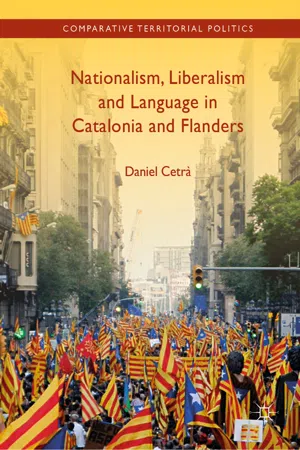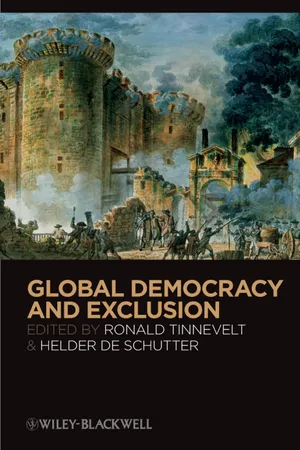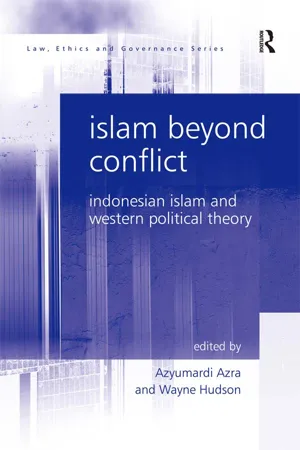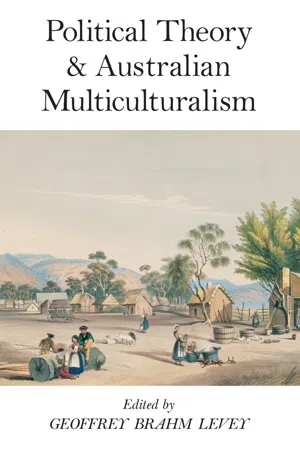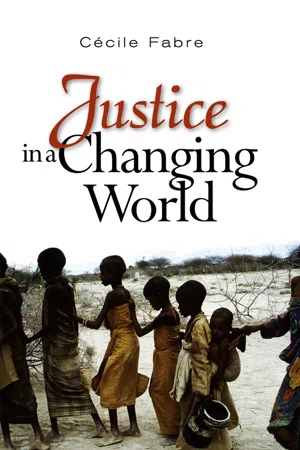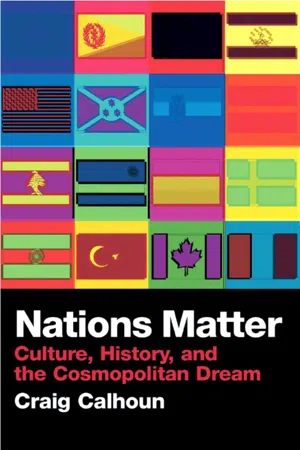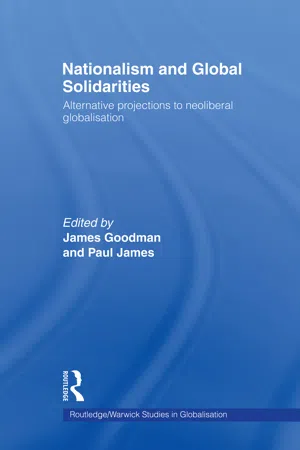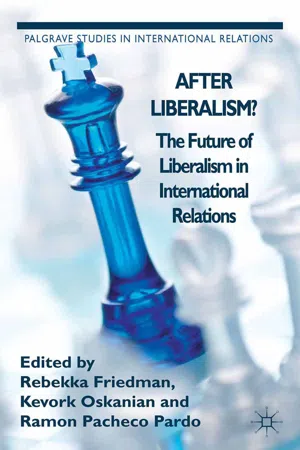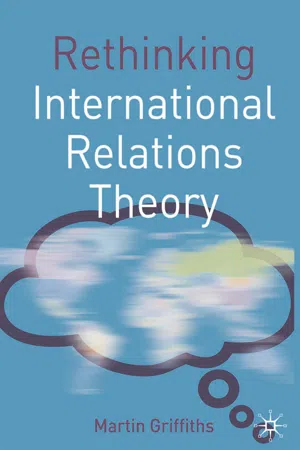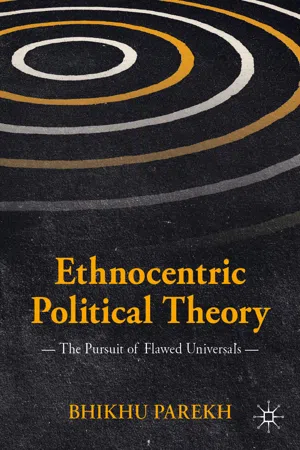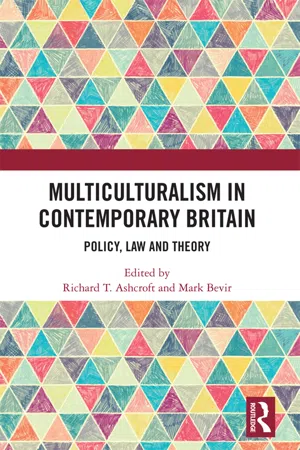Politics & International Relations
Liberal Nationalism
Liberal nationalism is a political ideology that combines liberal principles with a focus on national identity and self-determination. It emphasizes individual rights, democracy, and the rule of law, while also promoting the interests and cultural distinctiveness of a particular nation or people. This ideology often seeks to reconcile the values of liberalism with the preservation of national identity and unity.
Written by Perlego with AI-assistance
Related key terms
11 Key excerpts on "Liberal Nationalism"
- Daniel Cetrà(Author)
- 2019(Publication Date)
- Palgrave Macmillan(Publisher)
debateLiberal nationalists typically argue that ‘it is a legitimate function of the state to protect and promote the national cultures and languages of the nations within its borders. This can be done by creating public institutions which operate in these national languages; using national symbols in public life (e.g. flag, anthem, public holidays); and allowing self-government for national groups on issues that are crucial to the reproduction of their language and culture (e.g. schemes of federalism or consociationalism to enable national minorities to exercise self-government )’ (Kymlicka 2001 : 39). Note that liberal nationalism calls for recognition and accommodation of both majority and minority national cultures and languages that fall within the boundaries of the state. In fact, Kymlicka and other liberal nationalists are quite sympathetic with majority nationalism . They object to the idea that the statewide majority should be able to impose its preferences throughout the state. There are also statist versions of liberal nationalism : David Miller (1995 ) tries to convince social democrats that a shared national identity and mutual concern is a requirement for a socially fair and egalitarian society, and in his argument the defence of ‘nationality’ becomes in fact a defence of nation-states. The broader point is that, for liberal nationalists, liberal democratic political communities should promote national cultures and should themselves be national in scope because national cultures are a precondition of the liberal ideal of individual autonomy- eBook - ePub
- Ronald Tinnevelt, Helder De Schutter, Ronald Tinnevelt, Helder De Schutter(Authors)
- 2011(Publication Date)
- Wiley-Blackwell(Publisher)
For the purposes of this chapter, we take as given the existence both of Liberal Nationalism and of claims for forms of democracy beyond the nation. Our claim is simply that if you are a liberal nationalist, there is no internal theoretical necessity for you to reject global democratic commitments. For anyone who is committed to either Liberal Nationalism or global democracy, the results of this project, if successful, offer hope, since in each case they eliminate one crucial source of opposition to the defended cause. 2. Defining the Terms 2.1. What Is Liberal Nationalism? Because an argument about the compatibility of Liberal Nationalism with global democracy will hinge on what we take those terms to mean, it is important to explain our understanding of them. What is Liberal Nationalism? In general, Liberal Nationalism’s main feature is that “it fosters national ideals without losing sight of other human values against which national ideals ought to be weighed” (Tamir 1993, 79). Thus understood, it is primarily a very moderate nationalism, a nationalism stripped of the illiberal tendencies it has acquired in the course of its history. More specifically, Liberal Nationalism has, as its name suggests, a liberal and a nationalist component. Its basic aim is to show that both components can be reconciled. Nationalism need not be inherently illiberal, and liberalism does not have to be inherently antinationalist. Let’s look at each feature in turn. The liberal characteristic of Liberal Nationalism is exhibited by the belief that individual rights should not be overridden by group rights, as well as by the stipulation that nationalism has to be “moderate.” Liberal nationalist policies are not aggressive toward other national identities and typically expose a “thin” or open conception of national identity. This thin view ensures that in principle everyone can join the nation - eBook - ePub
Islam Beyond Conflict
Indonesian Islam and Western Political Theory
- Wayne Hudson, Azyumardi Azra(Authors)
- 2017(Publication Date)
- Routledge(Publisher)
It has been argued that it was merely fortuitous that liberalism and nationalism arose together in Europe to form a union enabling wealth creation within cohesive national boundaries (Meyer 1998, 63). But the alliance, however practical, presents theoretical problems. The principles of nationalism are not the founding principles of liberalism. Liberalism gives priority to individuals over community. The protection of individual rights, not collective utility or popular will, is its paramount concern. The core liberal idea is that the sole legitimacy of the political state resides in its function as an instrument for the protection of individual rights to life and property. Liberals have therefore been highly suspicious of, and resistant to, all ‘collectivist’ or ‘communitarian’ arguments.It seems anomalous, then, that liberals should have privileged a particular form of community, namely the national one. Liberal states are nation states, ‘nation’ implying something higher than the mere political organization of power for security purposes. A nation is a community (even if only an ‘imagined’ one – Anderson 1983) that has traditionally demanded something more from its members than obligatory obedience to order-securing rules. Liberal nation states have demanded – and received – love that transcends individualism and encourages sacrifice.Liberals have, for the most part, accepted nationalism without worrying much about whether it contradicts their own most basic, individualistic assumptions. Even today many accept that liberalism is dependent on the existence of some kind of nationalist sentiment, arguing that the latter ensures the social and cultural integration presumed necessary for the smooth functioning of liberal democracy. Aware that traditional nationalism based on blood and descent has lost the intellectual and moral respectability it once had, modern nationalist liberals seek some benign ‘civic’ form strong enough to promote a sense of commonality and belonging, but not so strong as to encourage xenophobia (Miller 1995; 1998; Barry 1999).One of the arguments put forward by David Miller on the need for a nationalist sentiment concerns the sacrifices he believes are required for meeting the demands of social justice. He claims that there is unlikely to be democratic support for the redistribution of resources unless citizens regard themselves as bound to the beneficiaries by strong ties of community, and by a sense of common identity (Miller 1998, 59, 236).1 In this chapter I - eBook - ePub
- Geoffrey Brahm Levey, Geoffrey Brahm Levey(Authors)
- 2008(Publication Date)
- Berghahn Books(Publisher)
The self-determination of individuals and the self-determination of nations seemed all-of-a-piece, the same ideal writ either small or large. The self-rule that nationalities attained in achieving their own state would, it was believed, naturally find expression in a liberal democratic polity. 7 Moreover, independent liberal nation-states, connected by bonds of mutually beneficial trade and amity, would coexist peacefully in an international order that would be an expanded version of the liberal national community. The natural extension of Liberal Nationalism, in other words, was liberal internationalism, an ideal that found its most famous expression in Kant’s essay “Perpetual Peace.” 8 History would demonstrate, however, that the connection between nationalism and liberalism was contingent and fortuitous rather than logical (Meyer 1998: 63). Indeed, there seemed to be no principled reason why national states should not be antiliberal, as Otto von Bismarck proved in Germany, nor why illiberal nation-states should not reveal bellicose ambitions. 9 The liberation of peoples and cultures suffering the oppressive yoke of foreign domination, or their unification under a single political state, however laudable, rested on a presumption different from the individualistic and pacific premises of liberalism. Moreover, theoretical liberalism, though it had developed distinctive arguments about the state and the extent of the individual’s obligations to it, had offered no explicit theories about the cultural nation. 10 The hero of French revolutionary mythology was the abstract individual “citizen,” implying political participation in, and co-ownership of, the new republican state, but how did such a citizen connect with any particular cultural group or “people”? When liberal thinkers addressed this theoretical issue at all, their appeal was to expediency rather than to logic - eBook - ePub
- Cecile Fabre(Author)
- 2013(Publication Date)
- Polity(Publisher)
As we saw in chapter 1, communitarians charge Rawlsian liberals for not being sufficiently attentive to the importance of communal attachments for the formation of the self. As we also saw in chapter 3, multiculturalist liberals such as Kymlicka have taken that point on board and used it as the basis for their defence of minority rights. Liberal Nationalism straightforwardly pursues this line of thought and argues that national belonging is, for the overwhelming majority of individuals, a crucial component of their identity. Note, though, that, for those liberals, national identity is to be understood in a cultural, rather than an ethnic, sense. To be sure, nationality and ethnicity do overlap. However, as multi-ethnic nations show, they are not identical: thus, Americans form a nation, whether they are black, Jewish, Latino, or Irish. The question is whether ethnicity should mark off self-determining communities from one another. And, to this question, the liberal nationalist answer is, unambiguously, a ‘no’. For it is central to liberalism – or at least to contemporary liberalism – first, that, at least up to a point, individuals should not be disadvantaged for reasons which are beyond their control, and, second (and relatedly), that they be seen and treated as authors of their own lives. If so, then to use ethnicity, over which we clearly have no control, as the basis for national self-determination claims is clearly illiberal (Gans, 2003; Miller, 1995; Tamir, 1993). Let us look a bit more closely at the standard liberal nationalist defence of the view that nations need their own states. With nuances and qualifications which need not detain us here, it can be formalized as follows (Miller, 1995; Margalit and Raz, 1990; Tamir, 1993). 1 Individuals have a fundamental right to live in an environment which is conducive to their well-being. 2 National identity is a constitutive element of individual well-being - eBook - ePub
Nations Matter
Culture, History and the Cosmopolitan Dream
- Craig Calhoun(Author)
- 2007(Publication Date)
- Routledge(Publisher)
A deep mutual relationship has tied nationalism to democracy throughout the modern era. Nationalism was crucial to collective democratic subjectivity, providing a basis for the capacity to speak as “we the people,” the conceptualization of constitution-making as collective self-empowerment, and commitment to accept the judgment of citizens in general on contentious questions. As important, democracy encouraged the formation of national solidarity. When states were legitimated on the basis of serving the commonwealth, when collective struggles won improved institutions, when a democratic public sphere spanned class, regional, religious, and other divisions this strengthened national solidarity. It is a pernicious illusion to think of national identity as the prepolitical basis for a modern state – an illusion certainly encouraged by some nationalists. It is equally true that national identity is (like all collective identity) inherently political; created in speech, action, and recognition. A democratic public is not merely contingent on political solidarity, it can be productive of it.Of course political community can be and is constructed on bases other than nations. Most people live in multiple, overlapping zones of solidarity. There are varying degrees of local autonomy within nationstates, and varying degrees of integration among neighboring states. And of course nations can be transformed; they need not be treated as prepolitically given but can be recognized as always made – culturally as well as politically – and therefore remarkable. But the idea of democracy requires some structures of integration, some cultural capacity for internal communication, some social solidarity of “the people.”Liberalism within or beyond nations
Political liberalism developed largely in the effort to theorize the transition from pre-national empires, monarchies, and aristocracies to nations. Nations were the primary political structures in which liberal individuals would be equals and have more or less universal rights.The same liberalism was well attuned, of course, to recognizing the failures of actually existing nations, including especially failures to extend equal rights to all citizens. Liberals generally respond to these failings of nations and nationalism by abandoning reliance on historically achieved solidarities and subjectivities. This tendency has been reinforced by recognition of the ways in which globalization limits states. Seeking greater justice and liberty than actual nations have offered, they apply liberal ideas about the equality of and relations among individuals at the scale of humanity as a whole. But it is not clear that ratcheting up universalism makes it any more readily achievable. - eBook - ePub
- James Goodman, Paul James(Authors)
- 2006(Publication Date)
- Routledge(Publisher)
de facto endorsement of universalization of American norms in any case.Liberalism and nationalism are not mutually exclusive. Far from being universalistic, state-oriented liberalism can be seen as a form of nationalism, and indeed, more specifically still, in one of its guises as a form of racism. Its expressions can be various – note, for example, Will Kymlicka’s (1995:7) reference to ‘the continued influence throughout the world of the American conception of an ethnicity-blind constitution’. As Cole (2000:198) so compellingly argues with reference to immigration policy, ‘Liberal Nationalism takes the boundary between the inside and the outside as given, without asking how it came about…Along with more traditional liberal theory, it assumes a history in which colonialism and slavery never occurred – indeed, a history of another planet.’The misplaced belief that increased contact and understanding necessarily fosters commonality rather than an underlining of difference
Intimately intertwined with the problematics of progress, this continued misconception is likewise symptomatic of the legacy of liberalism (as well as again illustrative of the frequent asymmetry between intellect and emotion). It is hard to believe that the first scheme for a United Nations was conceived in the conviction that the scheme was so ‘reasonable’ that it would be adopted readily; harder still to believe the prevalence of the eighteenth-century view that in education and understanding lay the key to peace. The chequered history of eighteenth-century European hopes for progress is now graphically apparent. Two centuries later we are well aware that it is possible to educate in prejudice, that ‘understanding’ of the other can be used against them, and that rationality is a fragile and itself subjective category in the face of other human capacities of which liberalism says much less. Yet at another level, the dream of large-scale ‘progress’, despite (or perhaps because of ) the battering it has received, dies hard. - eBook - ePub
After Liberalism?
The Future of Liberalism in International Relations
- R. Friedman, K. Oskanian, R. Pachedo Pardo, R. Friedman, K. Oskanian, R. Pachedo Pardo, Kenneth A. Loparo, R. Friedman, K. Oskanian, R. Pachedo Pardo, Ramon Pacheco Pardo(Authors)
- 2013(Publication Date)
- Palgrave Macmillan(Publisher)
In the second section of this chapter, I will therefore try to recapture the core of liberalism by bridging the very divisions that lead to these partial conceptions. To this end, I will return to John Locke’s pre-disciplinary formulation of protoliberal principles, which explicitly theorise the connections between their core aspects and their political dynamics. This Lockean account of liberalism and its political dynamics, moreover, is broadly substantiated by the historical development of liberalism.Viewed through the lens of this alternative concept, recent history shows neither a “rise” nor a “fall” of liberalism. Instead, the shifts that undoubtedly characterise this period simply indicate liberalism’s adjustment to the power political opportunities and constraints provided by the international system. In short, they are shifts in form rather than substance. What comes “after liberalism”, I therefore conclude, is simply a different register of liberalism.Liberalism – DividedDuring the 1990s, a wide range of policies was prominently associated with liberalism. Among them were the liberalisation, deregulation, and privatisation of the international economy, the development of the World Trade Organization (WTO), and the transformation of former communist into capitalist states – in short, neoliberal economic policies. Proactive democracy promotion, as well as the widespread attempt to establish liberal market democracies as solution to failed, conflict-ridden, or even simply authoritarian states played an important role in the foreign policies of liberal states, of NGOs, and of international organisations and institutions, and gave rise to the notion of “liberal peacebuilding”. Liberalism was also associated with the proactive protection of human rights, not least in the form of humanitarian intervention as well as with plans to reform international law and international organisations in accordance with “a world of liberal states” (Clark, 2009; Keohane, 2003; Slaughter, 1995).In contrast to this spread of liberal norms, practices, and institutions, power politics generally associated with realism characterised the prior Cold War period. Capitalism, free trade, and free market principles were confined to the Western sphere of influence and tempered, domestically and internationally, by considerations of political stability. Democracy promotion was equally restricted and generally trumped by power political considerations; hence extensive alliances with authoritarian states and interventions in support of sympathetic rather than democratic regimes predominated. Human rights were generally subordinated to the principle of sovereignty. In short, the “rise” of liberalism was associated with the increase in policies explicitly designed to spread liberal norms, practices, and institutions. And it was the retreat from these policies towards the end of the 1990s and a more explicit turn towards traditional power politics after 9/11 that seemed to indicate a “fall” of liberalism. - eBook - ePub
- Martin Griffiths(Author)
- 2011(Publication Date)
- Bloomsbury Academic(Publisher)
The chapter begins with a brief analysis of nationalism, which sets the stage for appreciating the relationship between nationalism and democracy, and therefore the appeal of national self-determination. Just as a strong democracy presupposes a strong state, as I demonstrated in the last chapter, so does it depend on a stable national identity. National self-determination would therefore appear to be entirely compatible with, and perhaps a necessary pre-condition to, the promotion of democracy as well as peace. Indeed, national self-determination is a solution to the enduring problem of how to justify territorial boundaries and the political differentiation of humanity on the basis of territoriality. Unfortunately, the principle of national self-determination clashes with an equally important principle in international law and order (as well as for liberal internationalists), that of territorial sovereignty, which is the basis of regulatory liberalism. And just as the international community has yet to reconcile these competing principles, liberal internationalism provides inadequate prescriptive guidance to cope with the challenges ahead. The chapter concludes by suggesting that the only enduring solution to the problems of self-determination is to sever the historical link between self-determination, nationalism and territorial sovereignty, a solution far easier to achieve in theory than in practice.Nationalism
The concept of nationalism is not easy to define, because nationalism is not a single, undifferentiated phenomenon. Nationalism can take different forms across space and time. There are perhaps as many different kinds of nationalism as there are different countries and cultures. To make sense of the baffling variety of nationalisms, many commentators are inclined to split them into two fundamentally different categories, one bad and the other good. The use of binary oppositions can be traced back at least to the late 1930s, when Hans Kohn published his seminal work (1939). Since then the literature on nationalism has been replete with distinctions between Eastern and Western, ethnic and civic, particularist and universalist, illiberal and liberal, cultural and constitutional, reactionary and progressive, aggressive and defensive, or malign and benign types of nationalism. Not all of those dichotomies are necessarily well matched with one another. As a result, the literature on nationalism is a ‘terminological jungle’ (Akzin 1964: 7).The more serious problem for dualism is that such dichotomous models can be very misleading. Between the negative and positive poles of each dichotomy there is always a range of possible intermediate positions. Partly due to this dualistic way of thinking, there has been a tendency to label the type of nationalism one approves of with a favourable adjective, while maintaining a harsh, critical stance towards the type of nationalism one dislikes. However, the very assumption that there are bad and good forms of nationalism is problematic. Differences between ‘really existing nationalisms’ are not as clear, sharp and definite as is often claimed. None of them is absolutely bad or good. Rather, ‘all nationalism is both healthy and morbid. Both progress and regress are inscribed in its genetic code from the start’ (Nairn 1977: 347–8). Under certain circumstances, supposedly ‘good’ forms of nationalism may turn ‘bad’ and vice versa. - eBook - ePub
Ethnocentric Political Theory
The Pursuit of Flawed Universals
- Bhikhu Parekh(Author)
- 2019(Publication Date)
- Palgrave Macmillan(Publisher)
© The Author(s) 2019 Bhikhu Parekh Ethnocentric Political Theory International Political Theory https://doi.org/10.1007/978-3-030-11708-5_7Begin Abstract7. Liberal Democracy and National Minorities
Bhikhu Parekh1(1) Politics and International Relations, University of Hull, Hull, UKBhikhu ParekhEnd AbstractKeywords
Individualism Minorities SecessionLike other forms of government liberal democracies too have found it difficult to cope with the demands of territorially concentrated national minorities for greater autonomy . By a national minority I mean a group of people who have a strong sense of collective identity and form part of a larger political unit. It is a national minority because it has a more or less distinct way of life, institutions, traditions, history, etc. And it is a minority because its membership is numerically smaller than that of the rest of the country. A national minority might be territorially concentrated or dispersed. In the former case, it has a homeland, a place it regards as its own, and raises problems not shared by the dispersed national minorities. Since it has presented serious challenges to liberal democracy , I shall concentrate on it, and argue that its demand for greater autonomy deserves to be treated with sympathy.Liberal Democracy
Liberalism and democracy can be combined in at least three different ways, giving rise to three different kinds of political system. One might privilege democracy , give it a conceptual and moral priority, and allow it to set the limits of liberalism . This is democratic liberalism . Or one might do the opposite, and allow liberalism to set the limits of democracy . This is liberal democracy , that is democracy defined and structured within the framework of liberalism .1Or one might give more or less equal importance to both and suitably reinterpret and bring them into harmony. Although liberal democracy - eBook - ePub
Multiculturalism in Contemporary Britain
Policy, Law and Theory
- Richard T. Ashcroft, Mark Bevir(Authors)
- 2020(Publication Date)
- Routledge(Publisher)
It is more plausibly a project to be realized – perhaps via institutional reform – rather than an entity which pre-exists and justifies particular institutional arrangements. In fact, a political ‘nation-in-waiting’ would seem to be indistinguishable from a cultural nation. Regardless as to whether a pure political nationalism or similar political liberalism is viable, or whether a more capacious sense of ‘belonging to a polity’ (see the article by Mason in this volume) can do the relevant work instead, the standard liberal nationalist claim clearly refers to the broader elements included in a ‘cultural nation’. 10. This cultural nationalism is distinctively liberal in that, like a political conception of the nation, but unlike ethnic nationalism, in principle anyone can become a member. Any cultural nationalism that is exclusionary will be so because it is blended with an ethnic nationalism of some variety, and therefore does not fall under our use of the term. Our definition of the term is uncontroversial, and broadly matches Kymlicka’s own vocabulary (see Kymlicka, 2001, Chapters 2 and 12). 11. This claim can be attributed to both Kymlicka and Miller and is sometimes parsed as simply ‘shared values’, but for this to be empirically plausible in diverse societies it must be construed as referring to a shared range of values (Seglow, 1998). This claim is advanced by advocates of independence when they argue that Scotland, in contrast to the rest of the UK, is essentially a ‘social democratic nation’ interested in the sort of redistributive policies advocated by Miller (see Salmond, 2013). Yet the claim that the Scottish cultural nation is substantially to the left of the rest of the UK is not borne out by the evidence (see Curtice & Ormston, 2011; Keating, 2010)
Index pages curate the most relevant extracts from our library of academic textbooks. They’ve been created using an in-house natural language model (NLM), each adding context and meaning to key research topics.
